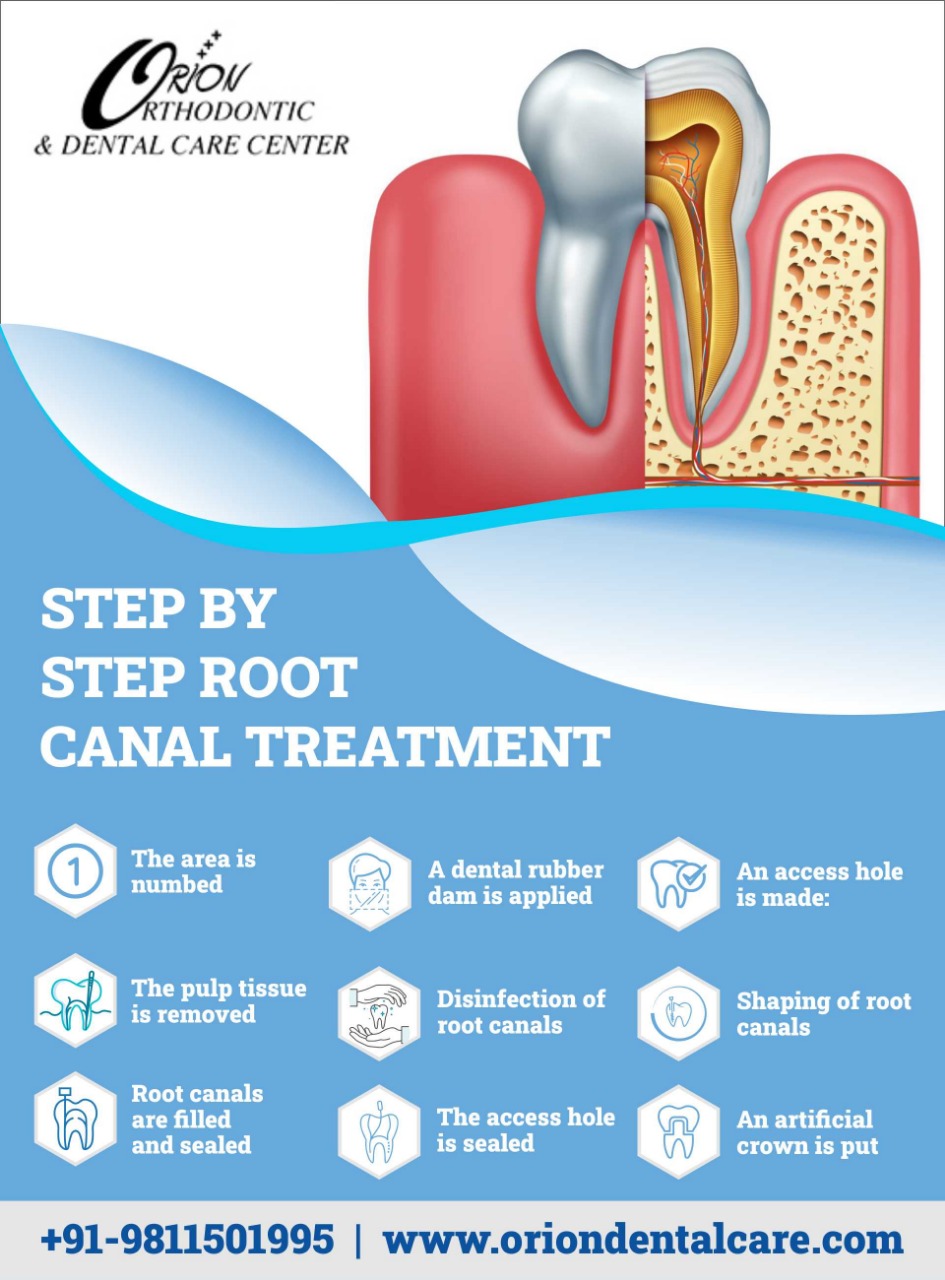If you are getting your Root Canal Treatment for the first time and are apprehensive about it, especially with all the myths heard around, stop bothering and be relaxed. We will help you understand the treatment. It is also known as endodontic treatment, ‘Endo’ (inside) and ‘don’t’ (tooth). A Root Canal Treatment repairs and saves a decayed tooth with inflamed or infected pulp. Pulp is the central and deepest part of the tooth which harbours the nerves and blood vessels. The treatment involves removing the decayed pulp, cleaning the inside of the tooth and roots, sealing it, and then restoring it with a filling and crown to strengthen it. It is a safe, almost painless and routine dental procedure that relieves you from infection and pain. It restores the normal look of your tooth and saves its potential removal.
Through this article, we will walk you through the Root Canal Treatment procedure, its preparation and the best clinic to go for availing the same. Knowing what will happen beforehand will ease you and make you go for it confidently.
Table of content
Feel free to skip ahead if one topic catches your eye:
1. Step-by-step Guide to root canal treatment
The specialist who performs the Root Canal Treatment is called an endodontist. After examining and assessing your tooth condition through X-rays and digital imaging, he/she will start the treatment which is usually completed in 2–3 sittings. Sometimes it can be completed even in a single sitting depending upon your tooth health. One sitting may last for 30–90 minutes. The various steps in Root Canal Treatment are as follows:
- The area is numbed: Local anaesthesia is injected to numb the tooth to be treated and its surrounding tissues, to relieve you from pain and discomfort.
- A dental rubber dam is applied: A thin rubber sheet is placed over the affected tooth and those surrounding them. A hole is made in the sheet through which the tooth to be treated, protrudes out, so that it is isolated, allowing the treatment in a contamination-free environment.
- An access hole is made: A small hole is drilled on the biting surface of the affected back tooth or behind a front tooth for entering the pulp and roots of the tooth (root canals).
- The pulp tissue is removed: The decayed or infected pulp is removed with very thin needle-like instruments, without causing pain as the area is numbed. Some discomfort may be felt which is tolerable and only until the pulp is completely removed.
- Disinfection of root canals: This is done by flushing the root canals with anti-bacterial and antiseptic solutions.
- Shaping of root canals: They are smoothened and made into desirable shape via tiny flexible instruments so that the fillings and sealants can properly fit into them.
- Root canals are filled and sealed: The root canals are washed and cleaned of any debris of pulp tissue. Filling material (Gutta-Percha) which fits snugly into your root canals is selected, heated, and compressed into and against your root canal walls with adhesive cement called sealer, to fill and seal them completely. This is very important to prevent reinfection.
- The access hole is sealed: This is done by a temporary filling, after which the rubber dam is removed.
- A permanent restoration is put: This is done after at least a week to allow the treated tooth to recover completely. An artificial crown on your treated tooth (capping) is then done to strengthen it, as it becomes brittle after removal of infected nerves.

2. How to prepare yourself for the treatment?
Here is a list of some dos which you must follow before getting a root canal, to prepare you for a successful procedure with the best results:
- Talk to your dentist: It is always good to understand the procedure and clarify all doubts with your dentist.
- Strictly say no to alcohol and tobacco: Tobacco is the riskiest substance for your oral health as it damages and stains your teeth. It can also cause mouth cancer, therefore it’s always advised to stop its consumption. Also, do not consume alcohol, at least 24 hours prior to the treatment as it hampers the anaesthetic effect and delays recovery.
- Eat a proper meal before the procedure: As your treated area will be numb for a few hours after the procedure, therefore, you will not be allowed to eat during that time. So, eating before the procedure will be helpful for your immune system to work optimally for better healing.
- Get sufficient sleep a night before: Adequate sleep helps to reduce anxiety and enhance healing.
- Freeze ice at home a day before: Cold compression with ice will help to relieve any discomfort after your RCT.
- A pain killer might help: Depending on your tooth’s condition, your dentist may prescribe pain killers, anti-inflammatory drugs and antibiotics before the procedure. This is usually done when there is acute infection and swelling.
So strictly follow your dentist’s instructions.
FAQs
a) Are there any side effects of the procedure?
There are hardly any side effects, except sometimes, a dull pain may be felt post-procedure, which disappears in about a week. Also, if good oral hygiene is not maintained, or if the procedure is done inaccurately, with remaining pulp tissue or loose restoration, then it may lead to reinfection.
b) Can everyone take this procedure?
People suffering from high blood pressure, diabetes, fever, infection, osteoporosis and autoimmune diseases must avoid this procedure or may get it done as per the doctor’s instructions.
c) How long will it take to recover from a root canal procedure?
It takes at least a week to completely recover from the procedure.
d) What is the cost of Root Canal Treatment in India?
The cost varies depending upon the city/clinic, dentist’s qualification and experience, type of tooth needing RCT, and type of crown selected. On an average, it cost from INR 2000 to 10,000, excluding the cost of the crown.
e) Are the results of the Root Canal Treatment permanent?
In most cases, the root canal-treated teeth last for a lifetime, provided the crown or filling does not break by chewing very hard foods, and good oral hygiene and regular dentist’s visits are maintained.
f) Is Root Canal Treatment painful?
The use of anaesthesia makes it a painless and comfortable procedure. Sometimes, mild pain and discomfort may be felt depending on your tolerability and tooth condition.
4. Takeaway
Visit Orion dental clinic for the best Root Canal Treatment in Delhi NCR. We provide complete dental and oral health solutions at affordable costs. The highly qualified and experienced dentists at Orion, provide the best guidance, diagnosis and treatment with the most advanced methods and technology. We maintain the highest level of inflection control and patient safety. So, stop waiting and visit us to retain your perfect smile.



